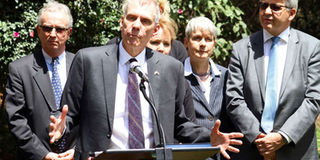US, EU envoys caution against poll law review

US ambassador to Kenya Robert Godec speaks to the press at Bomas, Nairobi on October 02, 2017. PHOTO | DENNIS ONSONGO | NATION MEDIA GROUP
What you need to know:
- The 14 envoys spoke of their concerns after a meeting with the IEBC leadership headed by chairman Wafula Chebukati, with commissioners Consolata Maina, Roselyn Akombe and Paul Kurgat present.
- They were critical of the attempts to make changes to electoral laws just days to the repeat poll and demands for staff changes at the IEBC.
Diplomats have asked President Uhuru Kenyatta and National Super Alliance presidential candidate Raila Odinga to stop playing political games and undermining the electoral commission ahead of the repeat presidential elections.
They also warned that hardliners and inciters on both sides of the political divide could be sanctioned by their countries, travel bans and denial of visas included, if they are seen to be advocating for violence and spreading hate speech.
Specifically, they were critical of the attempts to make changes to electoral laws just days to the repeat poll and demands for staff changes at the Independent Electoral and Boundaries Commission (IEBC).
BEST PRACTICE
“It is international best practice not to make changes to electoral laws without broad political agreement. If everyone were to agree on changes that needed to be made, that would be fine but at the moment, we would encourage everyone to look at international best practice and work together to bring the election and make it free, fair and credible and peaceful and hold it in the constitutional manner,” said United States ambassador Robert Godec.
The 14 envoys spoke of their concerns after a meeting with the IEBC leadership headed by chairman Wafula Chebukati, with commissioners Consolata Maina, Roselyn Akombe and Paul Kurgat present.
They said, in a statement read by Mr Godec, that while it is time for both sides to show leadership, strengthen Kenya’s democracy and build the country’s international prestige, the opposite is being done by the political leaders.
“The “Election Laws Amendment Bill,” for example, puts at risk the IEBC’s ability to conduct a better election within the mandated 60-day timeline, and unnecessarily increases political tensions,” they said.
Their problem with the bills is their timing so close to the elections and the lack of agreement.
“Wise reforms to an established electoral process take time. They require thoughtful reflection and broad agreement from all parties. Well-established international best practice is to avoid changes to electoral rules just prior to an election,” they said.
POLITICAL DEMANDS
The bill in Parliament has been sponsored by the Jubilee Party and its existence was the reason for the collapse of talks between them, Nasa and the IEBC at Bomas on Thursday last week.
Introduction of the bills drew attention away from the Opposition’s many demands on the IEBC, making them Jubilee’s political weapon against their rivals.
The envoys said “the growing political demands, inflammatory rhetoric, and boycott threats undermine the IEBC’s ability to carry out its constitutionally-mandated job to hold a new election.”
“For example, if IEBC personnel are to be removed, it should only be done by the appropriate authorities and be consistent with the law and relevant regulations,” the envoys said.
Nasa has since the day of the decision of the Supreme Court been on a crusade against the IEBC and has singled out members of staff, with chief executive Ezra Chiloba top of the list, they say should be sacked before the repeat polls.
TRAVEL BANS
Asked about the threat to impose sanctions on some politicians, Mr Godec said: “We are watching what’s happening and if and when appropriate, we will take steps under US law to hold people accountable. There are many different potential measures we can take and I am not going to get into that speculation but I will say obviously visa bans and other travel measures are one possibility.”
The European Union’s official, Bruno Pozzi said they were looking at the situation and had not thought of any measures.
United Kingdom’s deputy ambassador Susan Kitchens was more direct, saying: “We are also watching carefully and anyone who is found to be inciting or engaging in violence must be held accountable and that should be done by Kenyan institutions. We are following too and the UK reserves the right to take appropriate action which may include refusing visas.”





